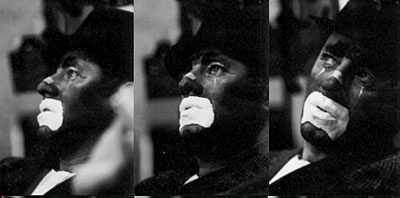




As the year is starting to draw to a close, various deadlines have bedeviled this blog's contributors, and, alas, postings have become more infrequent. Be this as it may, my attention was captured the other day by something I had been after for years. In fact, ever since I first heard about Jerry Lewis's legendary lost film, The Day the Clown Cried, I have yearned to see it.
Well, my dream didn't exactly come true, but I have come across a brilliant website, which not only features youtube clips but also the script, along with some amazing photos. Jerry is more often than not dismissed as an extremist, an embarrassment, on account of his masochistic reliance on infantile abjection as the basis of his comedy. Luckily though, there are scholars working against these facile dismissals. I am thinking here of people such as Steven Shaviro, who managed in The Cinematic Body to build upon the pioneering work of Scott Bukatman, who's "Paralysis in Motion: Jerry Lewis's Life as a Man" inaugurated this area of investigation. I should probably qualify the latter claim though, as one would also need to refer to Kaja Silverman's Male Subjectivity at the Margins and Leo Bersani's provocative piece, "Is the Rectum a Grave?", for comparable research, albeit without specifying Lewis per se.
What we have here are a series of works concerned with the ecstasy of abjection, the perverse pleasure following from the relinquishment of a proud male [erect] subjectivity, to a libidinal economy predicated upon loss, abandonment. One of the reasons I raise it here is that I think this critical tradition has bearing on my previous postings on "erasure". Here the problem, the perversion, may follow from a model of self that is too finely attuned to others. Overflowing with the milk of human kindness, maladaptive misfits to the core, Shaviro suggests an unconscious anarchism at work in such instances. When contrasted with the fatuous overbearing authority figures portrayed in Lewis's films, the dark secret of bourgeois family socialisation is revealed: it is the "competent" figures who are the true narcissists, because only they have the cognitive ability to successfully navigate Sennett and Rorty's contingent, "disordered" world, thereby securing their desires.
I do not assert this position as a viable constructive alternative to the aforementioned dramaturgical metaphors of selfhood. What I do argue though is that such reductions of the self to the level of abjection, to shit, a state prior to anything like an identity, have elsewhere served as a departure point for evaluating the ethical valency of shame. Unlike guilt, shame is irreducible to failure in one task, that could in turn be rectified by successfully repeating a ritual task. It relates more to an entire sense of individual worth, and as a result is not amenable to resolution. "Mother I've tried hard believe me/I'm doing the best that I can/I'm ashamed of the things I've being put through/I'm ashamed of the person I am", so sang Ian Curtis, and Henry Rollins eventually engaged the same trope, "I wonder if you can see/I wonder if you can tell/I wonder if you see right through the mask I wear so well/I'll never let you know what's going on inside me/my shame keeps me down".
One of the things I'm currently working on, which is distracting me from updating this blog, is the theoretical attempts to tease out some of the ethical implications. Shame might serve as a democratic sensitising device, alerting one to the needs of others. By the same token, it might have a purely corrosive effect which inhibits any capacity for normative reconstruction. In such cases it seems appropriate to speak, along with Bukatman, of "paralysis in motion". To my mind, Bukatman's archetype is an underexplored resource in rock music writing. Afterall, these performers are fascinating in part because we, the audience, get to play voyeur, by trying to figure out the interplay between the public/private personas. If I applied the abjection/shame trope to performers such as Jonathan Richman and Iggy Pop, it might become justifiable to trace a common lineage even further back, to Dostoevsky's The Idiot and Notes from Underground. Iggy chose the former as an album title, and Howard Devoto clearly referenced the latter in A Song from Under the Floorboards. How much of the status anxiety and attendant overcompensation in some of these cases may resonate with Bachelard's observation, "a creature that withdraws into its shell is preparing a way out", is an interesting question that also seems worth following up. In this spirit I venture the hypothesis that Richman might be the Professor Klump, "the Nutty Professor" of rock n' roll ("Hey little insect!!"), while Iggy is possibly its Buddy Love, "I've being dirt/and I don't care/cuz I'm learnin'".
Regretfully though, there are few in contemporary cinema able to approach the edginess of Lewis's best films. While it may be hard to match the intense vicarious thrills of becoming hopelessly perverted and evil, which follow on from watching Robin Williams, particularly Patch Adams, his body of work generally does not hold up in comparison with Lewis. This convinces me that it may be more fruitful to explore musical avenues when it comes to demonstrating the potentially expansive nature of this trope.
But I wouldn't dream of pointing anyone in a musical direction until they've fully explored this site:



No comments:
Post a Comment